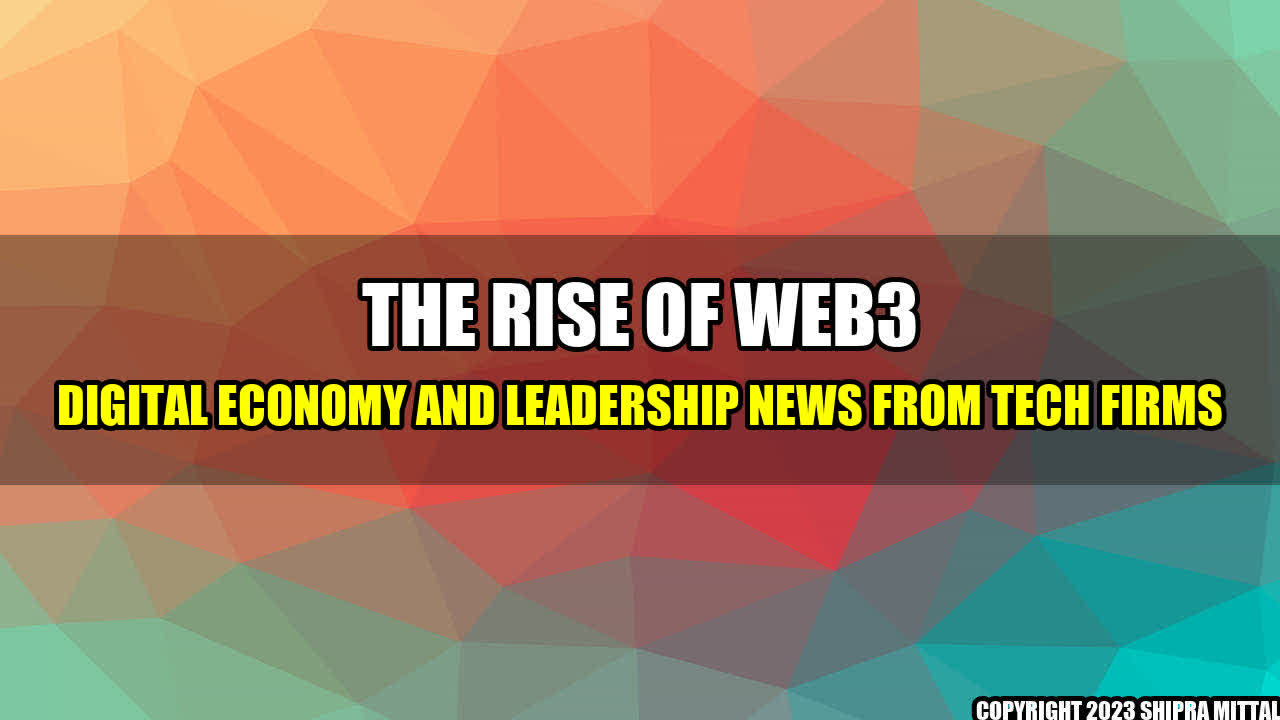The Rise of Web3 Digital Economy and Leadership News from Tech Firms


Once upon a time, the internet was a place where people could connect with each other and share information. But as it evolved, it became apparent that the internet was much more than that. It was the perfect platform for businesses to connect with their customers and for people to buy and sell goods. Then, came Web 2.0, which brought a more user-centric experience to the internet. But now, we are on the brink of a new era, the web3 digital economy. And at the forefront of this revolution, are tech firms who are leading the charge towards a decentralized future.
The web3 digital economy is essentially the next iteration of the internet, which enables a decentralized and autonomous ecosystem. Decentralization refers to the shift from a centralized model of governance and control to a distributed one, where no single entity has complete control. This is achieved through blockchain technology, which creates a tamper-proof and transparent record of all transactions.
Another key feature of the web3 digital economy is autonomous computing, which enables automatic execution of computer programs called smart contracts. Smart contracts can be used to automate complex and time-consuming processes, such as supply chain management and financial transactions.
Tech firms are taking a leadership role in the web3 digital economy by developing innovative products and services that facilitate transactions within a decentralized ecosystem. These firms are building the infrastructure for the future of the internet, paving the way for a more democratized, transparent and secure world.
One example of a tech firm leading the charge towards the web3 digital economy is ConsenSys, a blockchain software technology company founded by Ethereum co-founder, Joseph Lubin. ConsenSys is building the infrastructure for the decentralized web, including a decentralized finance (DeFi) ecosystem, and a decentralized social media platform called Akasha. Through its various products and services, ConsenSys is driving the development of the web3 digital economy by facilitating transactions and governance within a decentralized ecosystem.
Another tech firm that is contributing to the web3 digital economy is Brave, a privacy-focused web browser founded by Brendan Eich, co-founder of Mozilla. Brave is revolutionizing the advertising industry by enabling users to earn BAT (Basic Attention Token), a cryptocurrency, by viewing ads on the browser. This model creates a fairer and more transparent system for advertisers and users, and is an example of a business model that is being enabled by the web3 digital economy.
The success of the web3 digital economy can be seen in the growth of decentralized finance (DeFi). DeFi refers to financial applications built on blockchain technology that enable decentralized and autonomous financial transactions. The DeFi market has exploded in recent years, with the total value locked in DeFi contracts reaching over $50 billion in 2021, up from less than $1 billion in 2019.
Another quantifiable example of the success of the web3 digital economy is the rise of NFTs (non-fungible tokens). NFTs are unique digital assets that are being used to create new business models and revenue streams, such as digital art and collectibles. In March 2021, a digital art piece sold for a record-breaking $69 million at Christie's auction house, demonstrating the commercial potential of NFTs.
The web3 digital economy represents a new era of the internet, characterized by decentralization and automation. Tech firms such as ConsenSys and Brave are leading the charge towards this new future, by building the infrastructure and driving adoption of the web3 digital economy. The success of DeFi and NFTs are just two examples of the potential of this new paradigm. As we embark on this new era, we have the opportunity to create a more democratic, transparent and secure world.
Curated by Team Akash.Mittal.Blog
Share on Twitter Share on LinkedIn